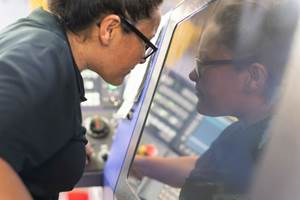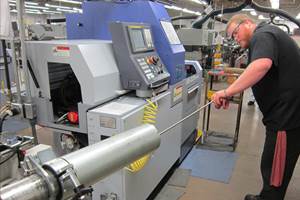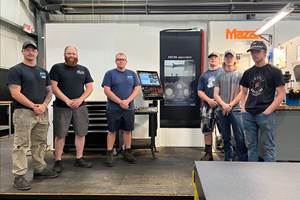Working To End Manufacturing's Labor Shortage
Members of the American Machine Tool Distributors' Association (AMTDA), who provide manufacturing solutions through applications, sales and service of machine tools, note a great deal of frustration in the marketplace. The statement from manufacturing customers that, "I'd buy another machine if it came with an operator!" is all too familiar.
Members of the American Machine Tool Distributors' Association (AMTDA), who provide manufacturing solutions through applications, sales and service of machine tools, note a great deal of frustration in the marketplace. The statement from manufacturing customers that, "I'd buy another machine if it came with an operator!" is all too familiar. These words reflect no humor; instead, they illuminate a collective challenge. There's no denying that a critical shortage of skilled labor exists. As a result, shops and plants must either close or relocate to wherever skilled labor can be found.
According to a 2001 study by the National Association of Manufacturers, more than 75 percent of manufacturers report a shortage of qualified machinists despite the recession in manufacturing and the economic downturn overall. It is a problem for all manufacturing industries, and forecasts predict a need for 10 million skilled workers by 2020.
In 1950, the number of skilled workers demanded made up about 20 percent of the workforce. That number rose to more than 65 percent in 2000, and the trend continues. Unskilled labor, however, represents only 15 percent of the workforce, having dropped from 60 percent. Some jobs were eliminated by automation, but the rest have gone off shore, where unskilled labor is both plentiful and affordable.
Meanwhile, the number jobs requiring a four-year college degree, such as lawyers, teachers, doctors, accountants and other professionals, remains consistent at 20 percent. But despite the lack of growth, today's youth are directed to pursue careers in the professional sector.
Why is this disconnect being fueled when a lack of growth is so evident? Unfortunately, this fact is not so evident to those outside manufacturing related industries. The general public—educators, legislators and parents—still labor under outdated perceptions of manufacturing jobs, conditions and compensation. This column is obviously preaching to the choir, but the choir itself has to sing louder if things are to change. Otherwise, the skilled jobs will migrate or be eliminated like the unskilled jobs.
This isn't to say that initiatives voicing concern and solutions throughout the nation and the industry don't exist. On many local, statewide and regional levels, grassroots activity is growing. The Student Summit activity at IMTS is a good example, as is the National Institute of Metalworking Skill, which has grown into a united consortium of metalworking trade associations, national labor organizations, council of state governors, companies and educators working to develop skill standards and credential assessments. It has awarded 3,000-plus credentials and accredited several hundred metalworking training programs in more than 30 states. The latter is the critical link in the chain to developing and growing the necessary skilled workforce. This is where the industry choir belongs—out in the community driving this initiative.
For example, at the request of AMTDA Regional Chairman Fred Joseph of Lance Co., a division of the Phillips Corporation in the Philadelphia area, the organization participated in a panel hosted by Chapter 15 of the Society of Manufacturing Engineers (SME), Deleware County Community College (DCCC), Drexel University and the Delaware Valley Industrial Resource Center. The goal was to "educate" educators and counselors in the Delaware Valley about the careers available in manufacturing and to raise awareness for a new partnership between the DCCC and Drexel University.
The new program creates the potential for students attending DCCC for an associate's degree in automated manufacturing, machine tool technology or mechanical technology to be fully enrolled as a Drexel student while concurrently earning a bachelor's degree in applied engineering technology. Students get exposure to a quality education from the region's leading institutions in technology education, yet the students and their supporting employers invest only $25,000 in tuition toward a Drexel bachelor's degree, instead of the $150,000 in full expenses incurred when attending Drexel's primary campuses. Now that's innovation—both educators and manufacturers realize the tremendous opportunity open to them.
This is a model worth duplicating on varying scales anywhere in the country. Industry partners and allies need to develop and strengthen public-private partnerships on education. Only through greater communication and understanding among all stakeholders—employers, teachers, students and government leaders—can a skilled workforce be cultivated and sustained.
Related Content
8 Ways to Increase Productivity on the Manufacturing Floor
When it comes to machine shop productivity, continuous improvement depends on efficient employees, equipment and processes.
Read MoreWill the “Great Resignation” Become an Opportunity for Manufacturers? Get Ready for the Returning 3 Million
The Great Resignation will become a Great Reapplication when employees currently able to stay out of the workforce return to it looking for something better. Machining employers that are already evaluating candidates for fit, without demanding specific skills coming in, might be positioned well to draw upon this wave.
Read More6 Tips for Training on a Swiss-Type Lathe
There are nuances to training a person to effectively operate a Swiss-type lathe. Derek Korn, Production Machining’s editor in chief, shares suggestions from a CNC machine shop.
Read MoreTop Shop Builds Upon Employee Ownership for Future Success
In its quest to become the Fox Valley’s best-in-class employer, A to Z Machine has adopted an ESOP, expanded benefits and invested in apprenticeships.
Read MoreRead Next
3 Mistakes That Cause CNC Programs to Fail
Despite enhancements to manufacturing technology, there are still issues today that can cause programs to fail. These failures can cause lost time, scrapped parts, damaged machines and even injured operators.
Read MoreThe Cut Scene: The Finer Details of Large-Format Machining
Small details and features can have an outsized impact on large parts, such as Barbco’s collapsible utility drill head.
Read More








.png;maxWidth=300;quality=90)













